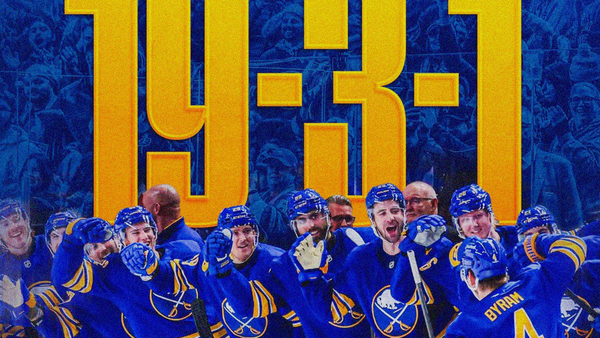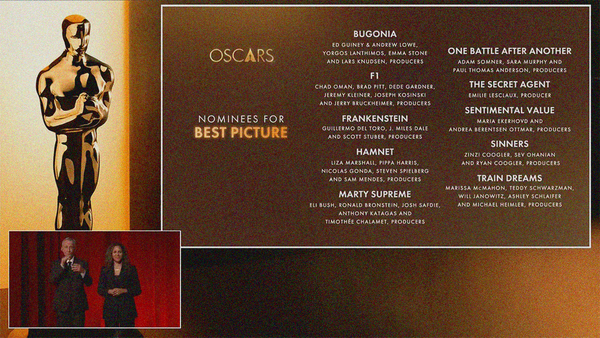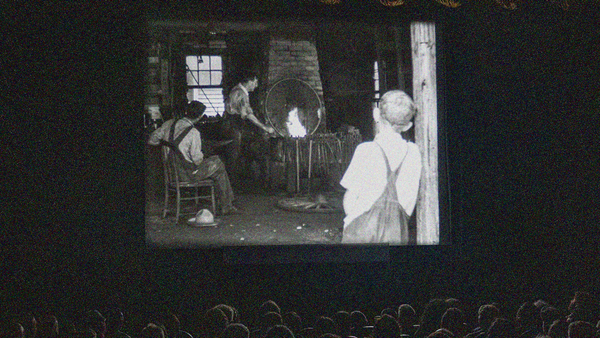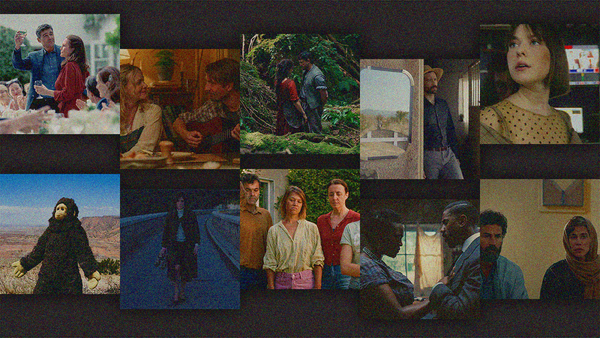TIFF 2025: Day Four
What's a Baumbach?
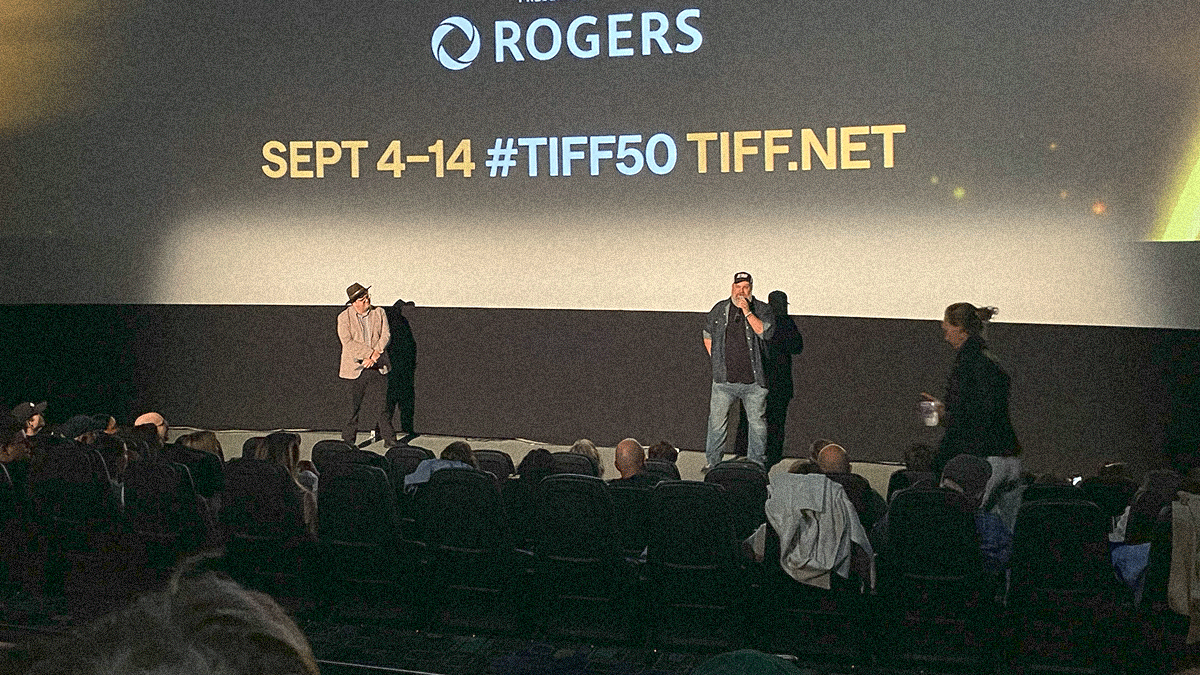
The "Family Guy" gag happened in real life for me today. I'd guess the audience for Good Boy (not the dog one—the Anson Mount chained in Stephen Graham's basement one) gave it about eight animated logos before the laughs began. Someone even yelled "Give us another!" after the tenth.
It wasn't even the funniest moment of my morning. No, that came from witnessing the insanity unfolding once the line for The Testament of Ann Lee press screening was let in. They eventually had to pause entrance while figuring out how many seats were left and that's when I overheard TIFF staff radioing ahead that some press ignored them and went up anyway ("We did not send them.") and saw a woman barge just through ("Which theater is it?" "Ma'am, the line is outside." "No, I'm a buyer and someone is saving me a seat, so which theater is it!").


Left: Tandoori chicken with rice and naan from T Dot's Naan-Sense. Right: Chocolate and strawberry gelato in a dish from 00 Gelato.
Thankfully, that was all the day's drama done by 9:00am. The rest was spent watching David Mackenzie's blast of a thriller Fuze; eating some Naan-Sense; finally meeting Stephen Lan, one of my favorite film publicists, in the flesh; hearing Adam Carter Rehmeier say the Carolina Caroline shoot was 92 locations in 25 days; and partaking in some 00 Gelato.
Today's schedule:
• Dead Man's Wire, d. Gus Van Sant | Special Presentations | USA | English
• Sacrifice, d. Romain Gavras | Special Presentations | United Kingdom, Greece | English
• Good Fortune, d. Aziz Ansari | Gala Presentations | USA | English

Bayaan
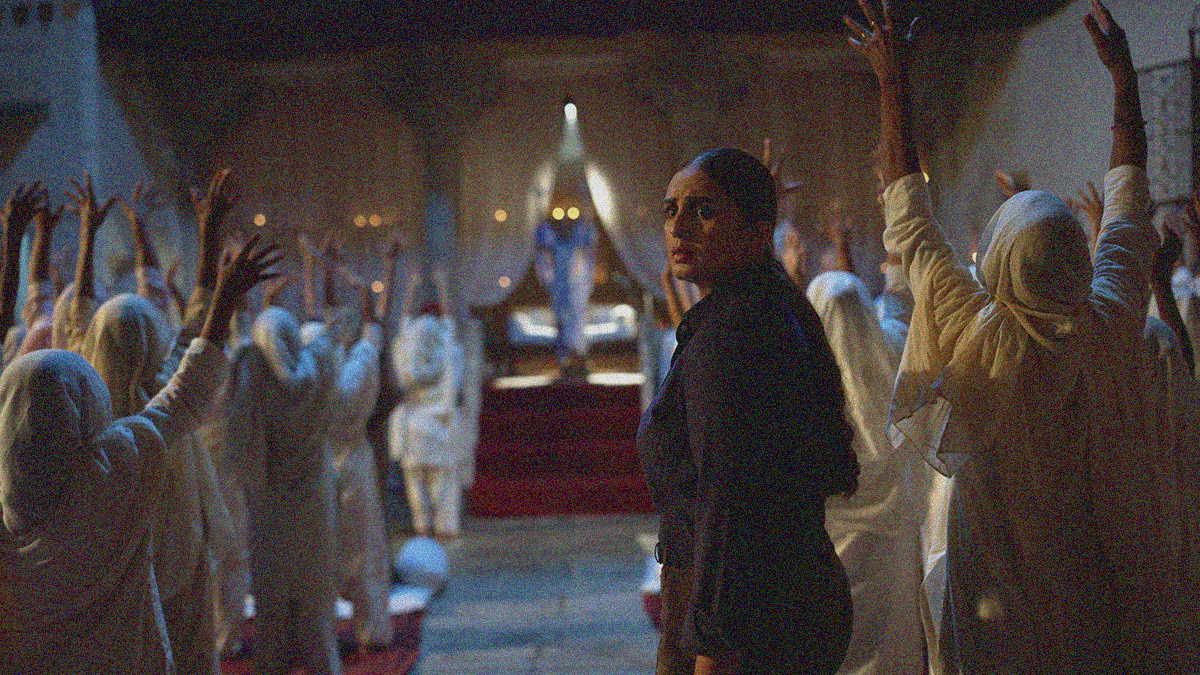
Despite being inspired by real case files surrounding the prosecution for rape of a commune leader known as "Holy Father" in India, there's no mention of the source material in the press notes and a cursory internet search yields too many potential results to know which is correct. I'm not sure there's a more sobering reality than realizing this subject matter has become too ubiquitous to track down. But that's the unfortunate side of faith's power when wielded by a malicious soul. The inherent exploitation. The survival instinct to stay silent. The knowledge that even more examples have probably gone unreported.
Bikas Ranjan Mishra's Bayaan (translated as "testimony") begins with a young woman's harrowing act of defiance to smuggle out a letter explaining what's been happening within the confines of her home by the hand of her sisters' God, Maharaj (Chandrachur Singh). What we don't realize at the time is that the danger born from blowing the whistle doesn't solely come from within those walls. No, the Maharaj has accrued so much power that his most ardent devotees praise his name outside of them. They see only the money he pours into the community's infrastructure and the pious smile. They know nothing of his true horror.
Exposing him becomes the task of first-time lead investigator Roohi (Huma Qureshi). Handpicked by her police chief in Delhi to follow in her famed father's (Sachin Khedekar's Kartar) footsteps, she arrives in a small Rajasthan town filled with the confidence to take down a monster. The head of the local police there (Paritosh Sand's Chauhan)—an old colleague of Kartar's—is all smiles when briefing her on the case, assigning Karnail (Vibhore Mayank) and Meena (Sampa Mandal) to her, and dropping the bombshell that she has only ten days before presenting to the judge. Roohi's big break quickly starts feeling like a set-up.
No matter how confident you are guessing how far up the chain of command or widespread amongst the town's residents it goes, however, you still might find yourself surprised. It's what makes the investigation so compelling since Roohi is fully committed to finding the truth regardless. She'll risk a contempt of court charge, walk right into the belly of the beast to strong arm commune supervisor Nirmala (Swati Das), and risk her own life to protect possible witnesses. And even when she gets everything necessary for a slam dunk trial, it somehow still seems to fall apart. Roohi's only chance at success is changing minds one-by-one.
It's a wild goose chase because Maharaj has covered all his bases. His mansion isn't a school, so they don't keep admission records. Acceptance of his protection leads to a religious rebirth wherein he gives each young girl a new name. And whenever something goes bad enough awry for one of them to run away, he personally finds them a husband so they can marry and spread his good word amongst the people. There's an excuse for every action taken in these girls' names and multiple layers of subterfuge shielding them and their family from being found after the fact. Anyone else but Roohi would have simply given up.
This is personal, though. This is a chance to step away from her father's shadow and prove to young girls that they can aspire to be more than wives and mothers. Roohi stakes everything she has to see the case through and uncovers as many fearful co-conspirators as followers willing to be awakened to the truth. Because the best protection from criminal charges is a blind fan club. Sure, some of them will still refuse to believe their own ears, but not everyone. There are simply too many corpses not to take note and too much corruption for Roohi not to take her father's advice, by way of Chauhan (and Fox Mulder), to trust no one.
Mishra's script for Bayaan is an impressively drawn procedural with multiple walls needing to be torn down. He's accounted for all the ground-level lies and shell games as well as the bureaucratic ones if Roohi ever gets that far without quitting or taking a promotion instead. It appears every single character beyond her has some secret revelation waiting in the wings too—either as the impetus for helping her or protecting Maharaj. Mishra is literally breathing life into the political turmoil afflicting his country today. So much so that he had potential producers backing out once its full scope was revealed.
Because it's ultimately about integrity versus complicity. It's about risking the little that you have in order to protect those with even less. And it's about the duty of a father being about more than preserving honor or hiding shame. The comfort with which Singh's Maharaj speaks about acting in the best interests of his "daughters" makes you want to take a shower to wash off his unchecked privilege, but the realization of what those words would mean out of Roohi's father's mouth or Pooja's (Molshri) father's mouth or Sati's (Aditi Kanchan Singh) husband's mouth might be worse. The misogyny on-screen isn't isolated to one man.
That's why it doesn't just take a proverbial village to stop violence. It takes one to facilitate it too. So, the film lives or dies by Qureshi's performance to ensure Roohi stands against the overwhelming horde of Maharaj apologists. The character even transcends its own case and metaphor too considering the rise of far-right populist regimes globally. America has all but turned into this Rajasthan town of zealots embracing their own pain like poor, twisted Nirmala (a complex character to whom Das gives a soul) because they've been told freedom away from it will be worse. We're sadly still searching for our own Roohi to remind us how it won't.
8/10
Dandelion’s Odyssey

"Its imaginative use of nature and time is objectively gorgeous, but it's also somewhat janky in the thought that we might not need those seeds at all. So, let the experience wash over you without thinking too deeply about logistics or narrative."
Full thoughts from Cannes at jaredmobarak.com.
Fuze
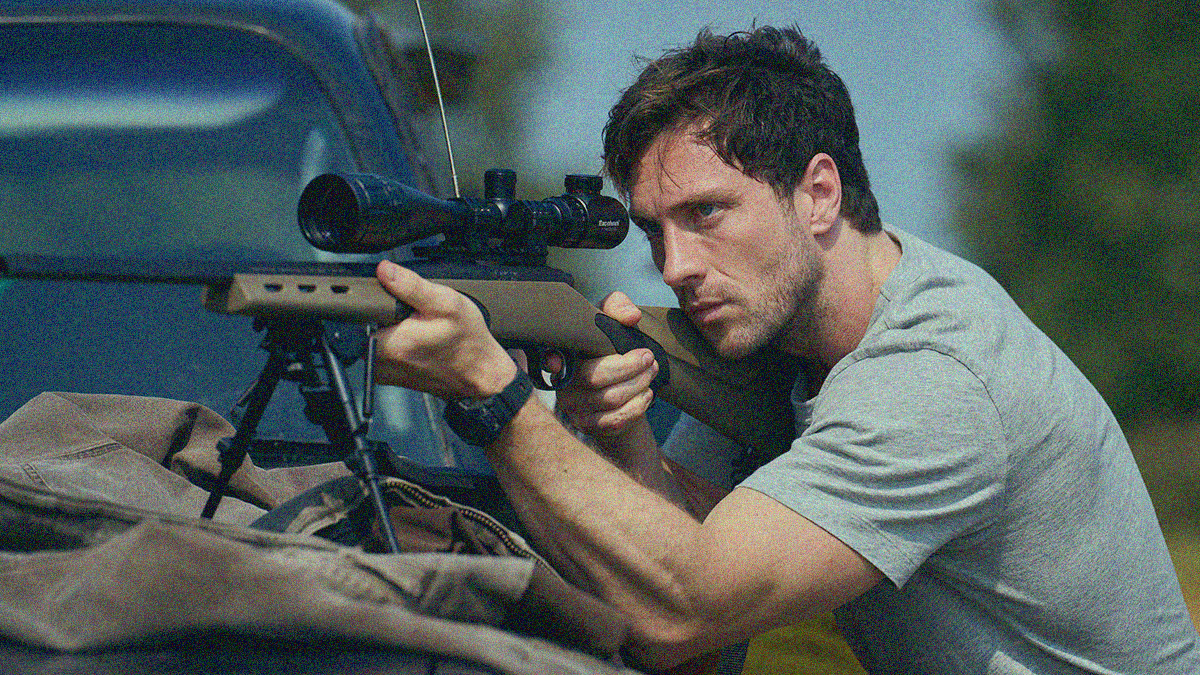
"Every maneuver places us front of mind to surprise, reward, or confuse. It’s a highly addictive candy bar of a movie that should satisfy anyone’s sweet tooth."
Full thoughts at The Film Stage.
Good Boy
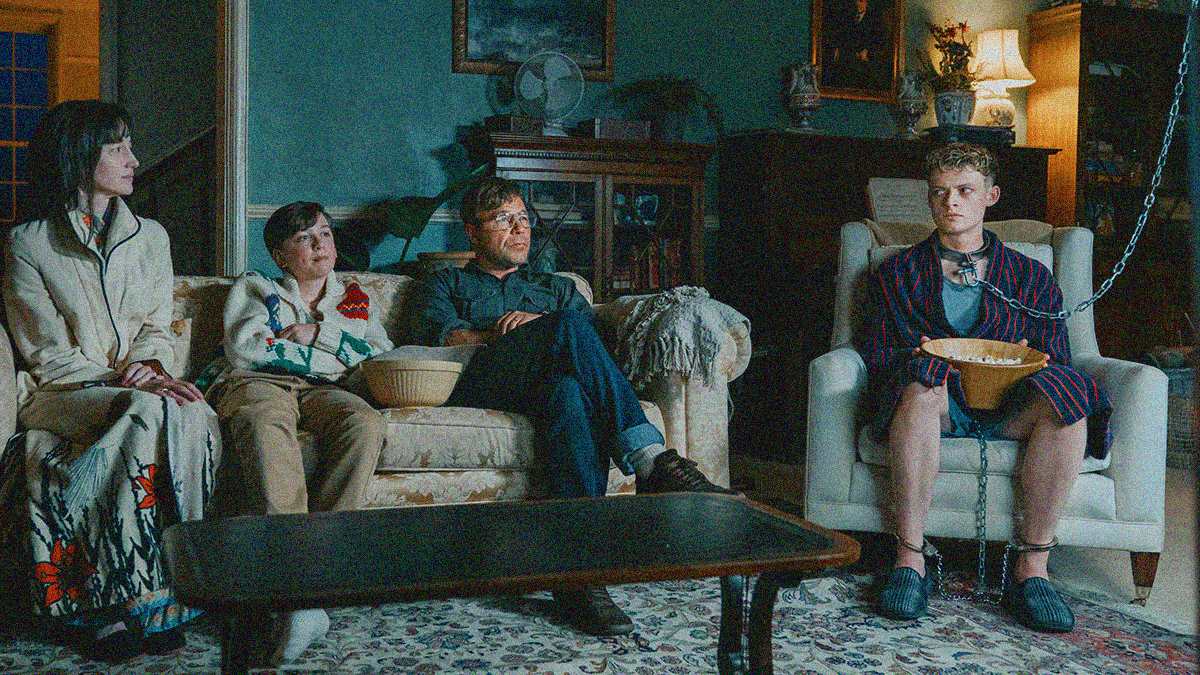
I’m a sucker for a messed-up premise that ultimately hits you in the heart by its end, and that’s exactly what Jan Komasa’s Good Boy delivers. Written by Bartek Bartosik (and co-written by Naqqash Khalid), the film deals with a grade-A criminal troublemaker getting kidnapped after his latest drug, sex, and violence-fueled bender leaves him stumbling through the street where most would be unconscious. Why does Chris (Stephen Graham) choose him? Well, I don’t think it’s a spoiler to say we never objectively find out. We can guess, though. And, regardless of the full truth, we definitely know it’s part of a last-ditch bid to coax his wife Kathryn (Andrea Riseborough) from her debilitating depressive state.
Is Tommy (Anson Boon) a replacement for someone? A new project? Is Chris looking to fill a hole in their family unit or provide a task to reengage her mind? Because this isn’t about punishment where their captive is concerned. The couple actively wants to rehabilitate him by weaning him off the self-medication and aggression to see what kind of person exists beneath the obvious trauma making him this way. Are they operating from a place of love if he’s also chained by the neck in their cellar to fulfill that goal? Well, it’s certainly not healthy (or consensual), but it might just work if they stick with it. And since their home is practically a gated bunker miles from civilization, there’s no reason they can’t.
The dog comparisons are easy due to the title and the way Chris operates with a firm hand upon Tommy’s arrival. Most bad behavior simply gets ignored since it’s verbal in nature, but those few times where the upper hand is momentarily lost for a physical infraction to occur do necessitate more drastic measures. And with that abuse comes the label of “bad boy” as a reinforcement mechanism. That whole “you’re only hurting yourself” mentality of training wherein the results might simply be a superficial mask to survive the moment while living to fight another day. The question therefore becomes whether his opportunity comes after he’s already discovered his anger cannot negate their success.
Therein lies the complexity inherent to our interaction with the film. Can we fully vilify them if their purpose is sound? Can we fully appreciate that purpose if their methods aren’t? Because it’s not just Tommy they're manipulating. It’s also their young son Jonathan (Kit Rakusen) being made to think everything is fine while enduring his own form of tough love. It’s also their new housekeeper Rina (Monica Frajczyk) being coerced into working around this unorthodox “therapy” because they know she has no other options as an undocumented immigrant fleeing an abusive situation of her own. Good Boy should be an absolute horror show and yet we totally buy its inevitable shift towards sweet absolution.
Kathryn is creepily sleepwalking through the house without uttering a word or expression at the start. Chris has a genial smile and demeanor that all but assures us it’s a façade hiding malicious intent (the routine of putting his toupee on to “act the part” is straight out of a slasher film). Komasa wants us to think the worst of them. He wants us to sympathize with the hateful punk caught in their house of nightmares so we can experience the full brunt of his depravity just as he does when force-fed his own social media archives. To see Tommy revel in the unchecked carnage he committed is abhorrent. And watching him grow to realize that fact himself cannot help but resonate.
If not for the first act, one might believe Chris provides a legitimate service to help a broken society rediscover its morality. Tommy integrates into the family. Rina does too. It’s still messed up thanks to the chain, but it also starts feeling real. That leaves a crucial pivot point for the filmmakers to either gloss over Chris and Kathryn’s crimes or embrace the reality that Tommy’s rehabilitation doesn't excuse them. This is brilliantly rendered by keeping our immediate focus on him throughout. By writing Tommy’s evolution and actions from a place of fear (for what they’ve done to him as well as what he’s done to others), he can ultimately choose his own destination.
Give Mount a lot of credit. The whole cast is wonderful with their common duality based in desperation and hope, but he's being transformed (Riseborough’s metamorphosis is more reclamation). Tommy feels absolutely nothing at the beginning—a man with no capacity to even fathom the concept of regret. And yet there he is tearing up at a sad movie. Reading books and engaging with their text. Seeing his former self as the monster he was. Yes, these realizations are a product of the abuse suffered, but they're also a testament to humanity’s inherent empathy if provided the love necessary to share love back.
7/10
Hamlet
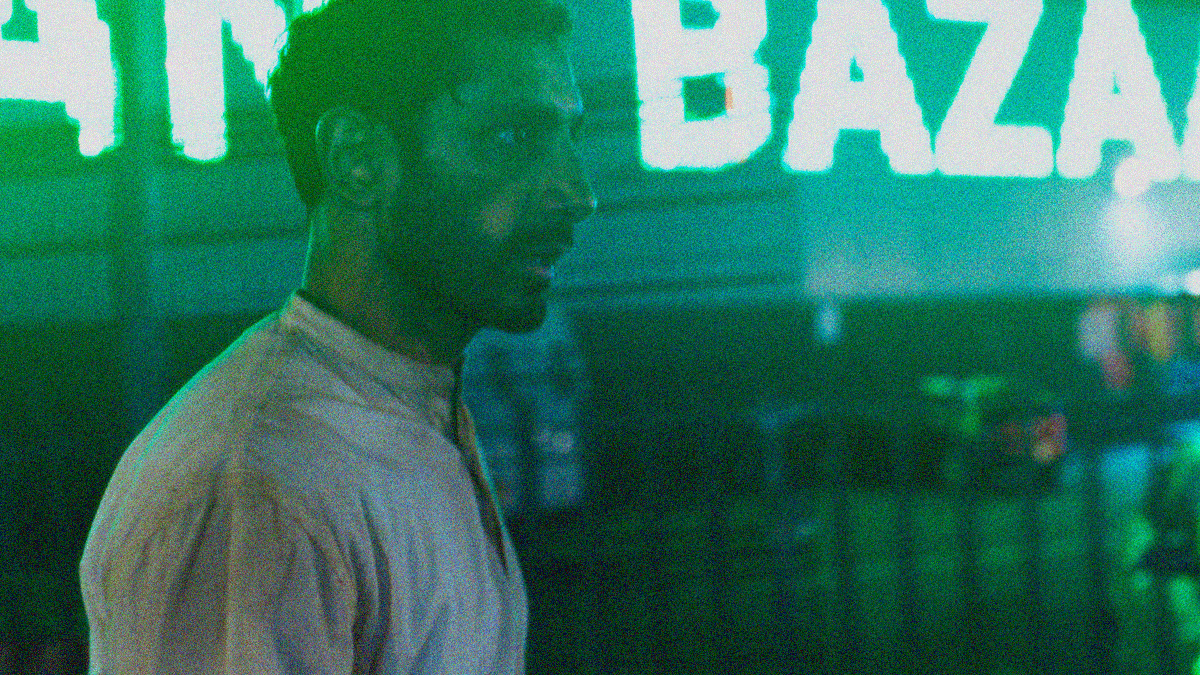
I think the best compliment I can give to Aneil Karia's adaptation of William Shakespeare's Hamlet is that I truly couldn't remember if the events happening on-screen were true to the text or completely new. Whether you love or hate the direction he, screenwriter Michael Lesslie (who also wrote the Justin Kurzel Macbeth), and producer/catalyst Riz Ahmed go, you cannot deny that they swung for the fences to deliver its words and themes in a wholly fresh and visceral way. This is a portrait of madness from grief and despair from corruption. It's a literal descent into Hell in which no one will ever escape.
That full-blown insanity is what struck me most because I don't recall any version going so hard into chaos. From the moment Hamlet (Ahmed) sees the ghost of his dead father (Avijit Dutt), something is irrevocably broken inside him. Not just because he allows himself to believe he's seen a spirit, but because he doesn't seem to care if it was real. As soon as the thought arises that his uncle Claudius (Art Malik) is responsible for his brother's murder, everything else just makes sense. Especially the fact that his mother (Sheeba Chaddha's Gertrude) has chosen to marry him so quickly after becoming a widow (regardless of it being custom).
Laertes (Joe Alwyn) and Ophelia (Morfydd Clark) constantly being present to finesse their friend at the behest of their conniving father (Timothy Spall's Polonius) does nothing to help matters either since Hamlet sees it as a ruse first and wellness check second. So, the more they push or seem to interfere with his ambitions for revenge, the meaner he becomes towards them. It's as though his entire world (born out of his father's company Elsinore) is conspiring against him. As if his return to bury his hero is some elaborate joke. Hamlet's motive therefore becomes burning it all down to get the last laugh.
If you're wondering why I've only mentioned six characters (besides the king), it's because that's all Karia and Lesslie include. The former spoke during my screening's Q&A about wanting to streamline things to ratchet up the intensity. To merge characters for a leaner trajectory that would ultimately allow for him to maintain Hamlet's perspective without popping in other people to speculate about what might have happened next. Ahmed spoke about the decision also allowing them to beef up Ophelia and Laertes specifically (by absorbing Horatio). They truly had a vision and worked tirelessly to give it life.
It becomes a very emotional journey as a result. Always in the moment. Always placing impulse above contemplation. And Ahmed has never been better with the camera often in his face to ensure the audience sees his manic disposition and hears his unhinged cackles when cracking off-color jokes to crickets while introducing the play at Claudius and Gertrude's wedding. He credits the musicality of the iambic pentameter for letting him tap into his other artistic half. Ahmed admits his rap career pulls out more of himself through its performances and this particular project blurred that line.
The violence is brutal. The pacing is breakneck. The "To be, or not to be" soliloquy is delivered out loud to himself while speeding down a highway on the wrong side of the road. That's the energy you can expect. Guttural screams and a desire to injury after every new body falls. Vicious assaults to perform an execution and to prevent it. And to make the play resonate even more today (beyond the depiction of a solitary man being told everything he can't have so that he must wonder if he's going insane or if the world has), the victims of Elsinore's greed for which Hamlet is complicit by name.
Things can sometimes move too fast, but they must to ensure we stay exhilarated from start to finish. Because the moment you pause to try wrapping your head around this prose in a modern-day setting, the artifice has a way of popping you out of the flow. I'll take the conscious removal of that threat every day regardless of any wonkiness that may result because I'm not the biggest Shakespeare guy. So, facilitating that level of engagement really helps my focus. Add a great cast expressively delivering their lines for context clues and a conscious decision to lean into the humor of Hamlet's spiral and I was rapt.
7/10
No Other Choice
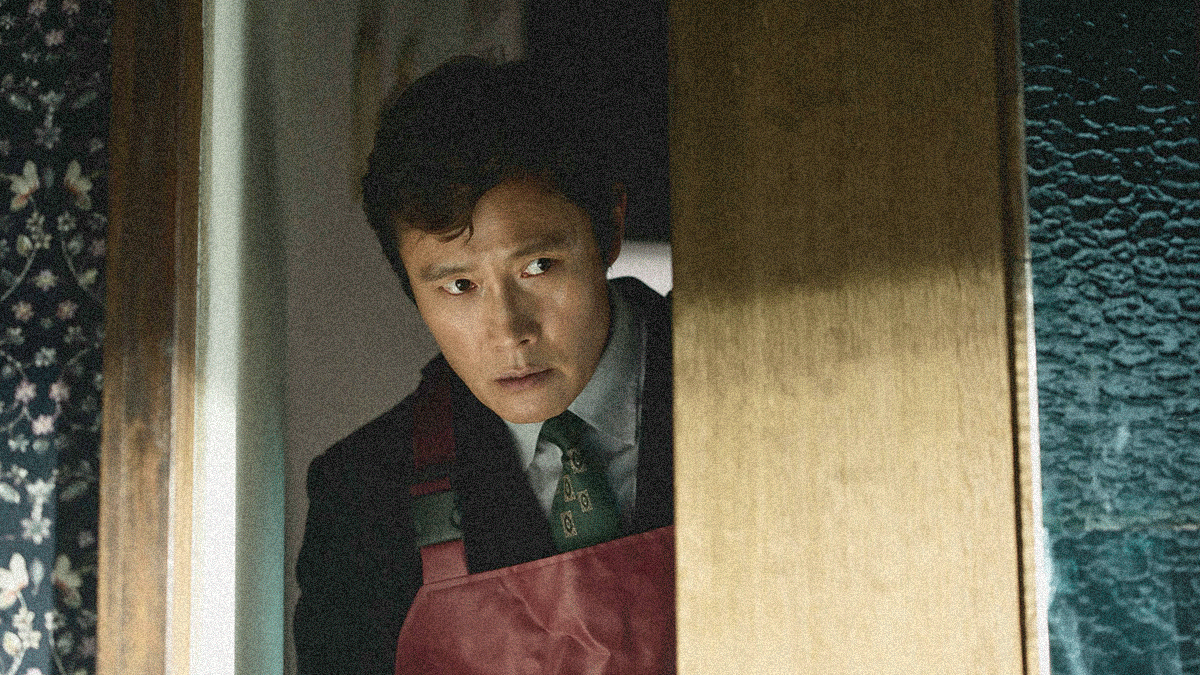
Never proudly exclaim how you “have it all.” Why play with fate that way? One day you’re eating eel off the grill with the family and the next you’re out of a job despite putting in twenty-five years. Then what happens if your expertise is so niche that there’s a good chance one or two people would be ahead of you in the interview rankings? What if your industry is dying to the point where companies must cut payroll and pivot to automation just to keep the lights on? You Man-soo (Lee Byung-hun) must confront all these questions to save the perfect familial portrait he’s created. His methods might be extreme, but he has No Other Choice.
Adapted from the novel The Ax by Donald E. Westlake, director Park Chan-wook and his fellow co-writers Lee Kyoung-mi, Jahye Lee, and Don McKellar push Man-soo to the edge of his sanity throughout the film. They give him the confidence to tell a prospective employer that his sole weakness is being unable to tell his boss “No.” They strip away his shame to grovel on the tiled floor of a restroom during a desperate attempt to get his resume in the hands of another. And they make him consider killing the competition just to steal a job. He would have done it too if not for the lucid realization that one corpse might not be enough.
Does that deter him, though? Of course not. He’s fighting a war for his family and there are no boundaries he won’t cross—no matter how difficult it is to ignore the moral threshold it will take. This is the main reason why the film is a comedy first and violent drama second. Because Man-soo is neither a trained killer nor a good liar. His wife (Son Ye-Jin’s Mi-ri) thinks he’s having an affair, staying out all night and coming home with injuries no one would ever receive on a real job interview. It’s to the point where she’s even gone back to work (she only ever quit because he told her to) just to stay afloat while awaiting the sale of their home.
It’s through this family dynamic that the literary adaptation evidence is most visible. There’s a lot going on. Mi-ri giving up dance lessons and tennis—both of which seem to also factor in her new young dentist of a boss. Their son decides to pivot a rebellious streak into petty crime to help raise funds. Their daughter is a cello prodigy who doesn’t speak beyond parroting certain phrases when they make an impact. Man-soo has a bonsai garden. His industry is paper manufacturing with its own rituals and loving attributes. And the men he must leapfrog in the job market all have their own independent lives that get revealed as he stalks them.
Don’t get me wrong, Park and company do a great job juggling all these threads into a coherent whole with fun connections that lead to hilarious misunderstandings and wild epiphanies insofar as how to better commit the crimes. There is an end reveal that’s purely superfluous considering where the characters are already positioned at the moment of its elucidation, but even that has a nice gag aspect to it. Especially because Lee is having such a good time in the role. I’ve seen him play so many super intense parts that I wasn’t quite certain what to expect here. But he is game for the tone and the physical pratfalls necessary to play the fool … while still also proving a formidable foe.
His adversaries are a major piece of the intrigue too, both because they’re so over-the-top in their unique characterizations and because they’re all pretty much just different iterations of Man-soo. They must be, right? They would be fighting for any job opening he wants and have been out of work for the same period of time—not to mention marital troubles, loneliness, and crippling anxiety. Having Park Hee-soon, Lee Sung-min, and Cha Seung-won bring them to life is merely an embarrassment of riches for what could be construed as meaty cameos. And if Man-soo wasn’t so hellbent on taking them out, maybe he’d learn a lesson or two rather than repeat their mistakes.
But that’s the appeal. We don’t want him to come to his senses. We want the silly carnage, bumbling police, and suspense of his family finding out and potentially blowing him in. We need it because letting Man-soo absorb the message being tossed around is much less entertaining. Actually learning that it’s not getting fired that matters but the actions taken in response to it is reserved for a straight dramatic take minus the snakebites, gunshots, and bodies wrapped in metal cord. Give Park credit for not giving us that version too since it would have felt more aligned to his career. Between this and Decision to Leave, it’s nice to see a celebrated auteur who refuses to grow creatively stagnant.
7/10
Sk+te'kmujue'katik (At the Place of Ghosts)
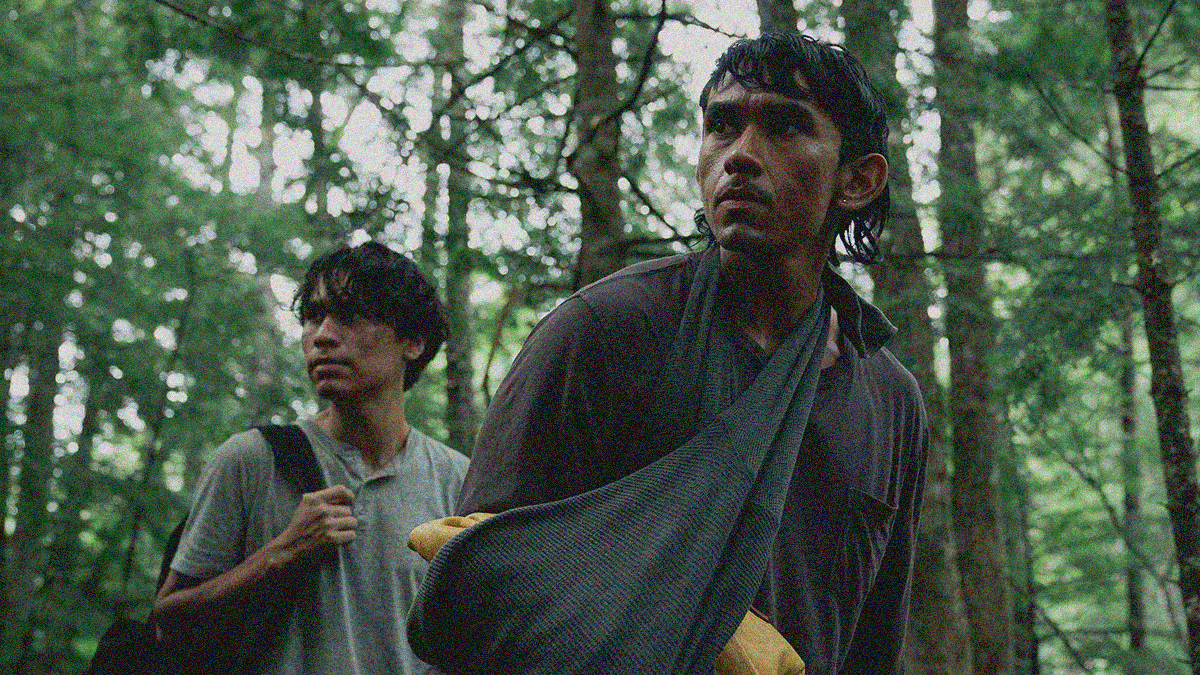
Mise’l (Blake Alec Miranda) knows exactly what they must do upon seeing a hooded ghost sitting at a table after the bar they're cleaning has already closed. Without hesitation they pack a bag, say goodbye to their partner, and head away from the city back to where they grew up in hopes of reconnecting with their brother who never left (Forrest Goodluck's Antle). Ashen leaves float around in the air as they approach, the specter of death growing more powerful. It's why Mise’l knows they can't confront this phenomenon alone. That, despite their promise, these siblings must enter the Old Forest one more time.
Written and directed by Two-Spirit L'nu filmmaker Bretten Hannam, At the Place of Ghosts takes these brothers into the fabled Sk+te'kmujue'katik. Known as a place outside of time and space that simultaneously houses the spirits of ancestors and descendants alike, it's akin to a Heaven on Earth for the Mi’kmaw people—one that colonialism fought to dismantle (along with Two-Spirit representation) to ensure assimilation into the Catholic ideal of eternal life. They must traverse this place of unknown trauma, potential violence, and necessary protection because industrialization threatens to uncover a shared, dark secret.
Antle justifiably believes Mise’l is simply battling guilt. That something has triggered a sense of paranoia and nightmare with no real basis in reality. Part of this is his skepticism about the more supernatural portions of Mi’kmaw tradition and part is because Mise’l promised him everything was going to be alright. It's not until he feels the ghost's presence himself—beckoning his young daughter Grace (Ainsley Cope) to enter those woods—that he understands the peril they all face. Antle also knows Mise’l cannot fight what awaits without him. Regardless of their lengthy estrangement, this must be done together.
The horror that results is a means to force them to reclaim their heritage (the shifting seasons of time place them in the middle of war, at the doorstep of a futuristic alcove, and in service to their great-great grandfather Holy Joe, played by Brandon Oakes) as well as their identity (we can clearly see Mise’l's queerness is a major part of their decision to live in the city and a factor in what happened all those years ago). Because to go back and confront what they did is to finally dare to speak their respective truths removed from the ingrained fear of childhood. It's ultimately time they each forgave themselves.
It won't be easy, though. Not just because of the historical threats that await (giant wolves and British muskets), but also that they are both being eaten alive from the inside. Mise’l has a black mark on their arm. Antle has one on his collarbone. It's a symbol of this evil coaxing them deeper into the forest and a test of their mettle to keep going despite the pain. Because it grows with every step they take towards that cave and every memory played out in front of them by their former selves (Skyler Cope and Atuen MacIsaac). Mise’l's drive to protect their younger brother returns alongside Antle's panic.
And through those glimpses—to which they interact with their echoes just as they do the foes and relatives providing real danger and healing respectively, regardless of whether it's all in their heads—we begin to piece together the trajectory to that fateful day. The abuse at the hands of their father (Glen Gould). The exposure of Mise’l's sexual orientation. The knowledge that such a discovery could cause a toxic mixture of indoctrination and alcohol to push an elder into wanting to erase them from the map. Why? Because that rhetoric seeps through even to Antle. He doesn't mean it, but it's still there.
At the Place of Ghosts would work as a wonderful double feature with another TIFF alum in Justin Benson and Aaron Moorhead's Synchronic insofar as their shared use of eternalism to blur the line between present selves and past/future shadows. This one obviously feels deeper as a result of it being intrinsically connected to Mi’kmaw culture rather than a science fiction conceit, though. The people Mise’l and Antle meet are personally interwoven into the fabric of their DNA. There's true beauty in each time shift supplying a lesson with as much chance of stopping them in their tracks as providing the strength to continue.
And it all culminates in a harrowing climax where these siblings are forced by the ghost and their own anguish to reenact what occurred. To see if the choices they made in the past were a product of being scared or a deep-seated value steeped in love—the same love that inevitably caused them to drift apart thanks to the misguided belief that their absence from each other's lives would help rather than just hurt them both more. Miranda and Goodluck astonish with an emotional vulnerability that shines through their manufactured façades of stoicism to finally find a cathartic release.
Nothing is guaranteed, though. Sk+te'kmujue'katik is all times and all spaces. We assume they're reliving their pasts and experiencing their futures, but who's to say they haven't done this before? Who's to say they didn't get eaten by a wolf or scalped by a Red Coat? What if they find what they're looking for and decide the choices made were wrong? If current resentments cloud judgment into believing the only chance for closure and quiet is to commit an even worse act of violence? Our only hope is that this instance is a good one. Not happy, since the pain will remain. Just good enough to be able to move forward ... together.
9/10
Wasteman
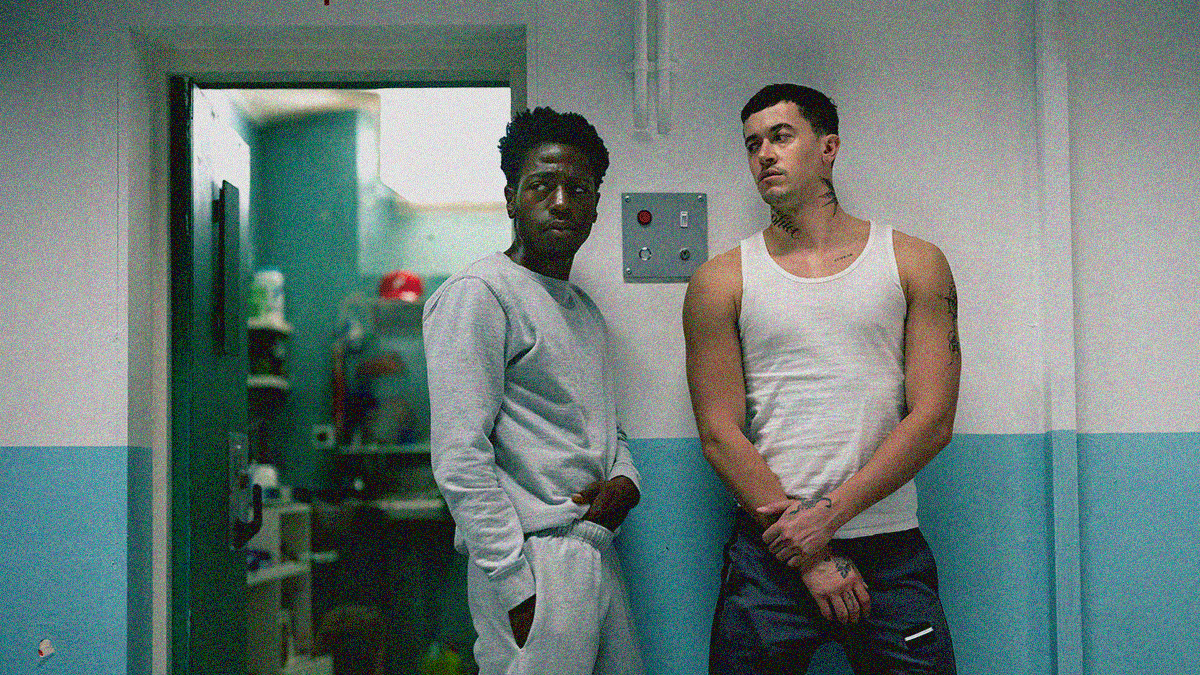
Shortly after becoming a father, Taylor (David Jonsson) found himself behind bars. He can't even remember why he did what he did beyond the faint notion of wanting to support the family he ultimately never got to have. The years passed, hope waned, and addiction ruled. He sought to keep his head down by cutting hair as trade for pills while sticking to the background whenever possible. And just when things looked to be at their worst—his dealers (Alex Hassell with Corin Silva as his muscle) seeking violent retribution for the theft of their product—a light appears at the end of the tunnel.
Hunter Andrews and Eoin Doran's script for Wasteman provides a chance at redemption due to overcrowding. If Taylor can get through the next few weeks without incident, he'll be free. While things should be quiet since that hunt resulted in his cellmate getting a TV to the face, fate has other plans. His attempts to give the good news to his estranged ex and teenage son Adam (Cole Martin) fail and the volatile Dee (Tom Blyth) arrives at his door. Uninterested in keeping a low profile, he transforms their cell into a commissary with the intent to monopolize the entire prison wing's illicit operations.
Director Cal McMau exposes the British penal system's nightmarish atmosphere by sprinkling savage cellphone videos amongst the close-quarters interactions between Taylor and his fellow inmates. Each movie is akin to a clout-building business card with evidence of how brutal the sender will become to get what he wants. They simultaneously make kings and destroy reputations by immortalizing those who initiated the beatdowns, those who fought back, and those who stood by and watched. Taylor hopes to avoid these cameras completely because he can't risk jeopardizing his release. Unfortunately, turf wars are never silent.
What Taylor doesn't anticipate is Dee instilling a bit of fun and compassion to these final days. Sure, he's a psychopath quick to turn threatening at the drop of a word he deems aggressive, but his connections prove very useful insofar as tracking down Adam and preparing a reunion. Dee has a cellphone to contact the teen and accomplices outside with the means of finding him to deliver gifts, no strings attached. Except, of course, that loyalty's string is ever-present in prison. Dee's kindness comes at the price of discretion. And if Taylor compromises that unspoken pact, well, you can guess what comes next.
Wasteman isn't therefore looking to surprise its audience. Its strength lies in the tension born from its unavoidable progressions. Because Russell and Silva are going to eventually make a move to reclaim the block and Taylor will inevitably do whatever he must to save himself. What will Dee require for penance and how far is Taylor willing to go to satisfy him? And if he comes through with accomplishing the first task, what's stopping Dee from moving the goalposts and forcing him to fulfill an even more perilous request? There's no escape from exploitation when you're the only one with everything to lose.
Blyth is very good at proving why charisma always creates a more dangerous enemy than sheer brute force. Because it's one thing to fear what guys like Russell and Silva will do. It's another to let your guard down and give your executioner everything he needs to destroy you voluntarily. His Dee wields a soft touch to groom Taylor into becoming his accomplice and setting him up to be indebted to him for the rest of his life. That's how men like him gain control and influence. He doesn't find your weakness. He lets you confide it, lends a friendly shoulder, and keeps it in his pocket for a rainy day.
Our main focal point is Jonsson as a result. Always quick to shuffle out the door before chaos ensues or back himself against the wall to feign invisibility if he's not fast enough, we must fear the worst for Taylor because his vulnerability when it comes to Adam requires that he relinquish all control. He can't do what Dee demands, but he can't refuse either. So, he becomes a sweaty ball of fear coerced into sealing his own demise during an expertly executed climactic countdown. This sequence is so well put together that we don't even have time to consider what we might have missed.
7/10

Pulled from the archives at cinematicfbombs.com.
Gravity screened on September 8, 2013 at TIFF.


